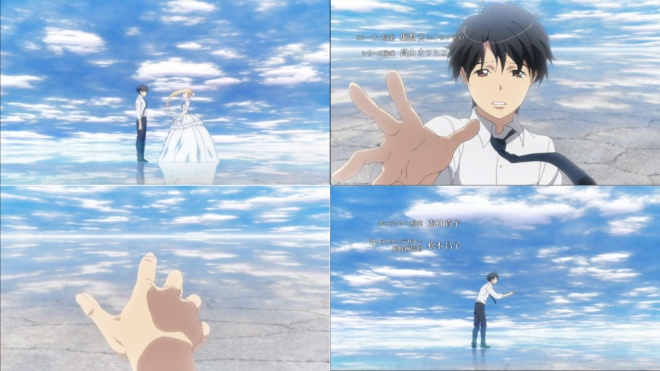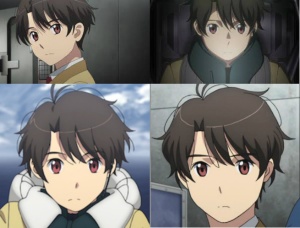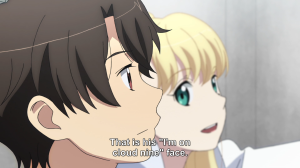Aldnoah.Zero season 2’s opening credits sequence has one of the most unintentionally funny moments so far in a 2015 anime. Recapping season 1’s bloodbath of a final episode, the opening images show protagonist Inaho and the Martian princess Asseylum being parted by the sudden violence that left her in a coma and cost him an eye. The animation in the sequence would have you believe that the trauma of losing Asseylum has had a profound emotional impact on Inaho; his face contorts with grief and his eyes appear close to shedding tears as the image of her before him disappears. The irony of this, as anyone who has watched Aldnoah knows, is that Inaho has never once displayed anything close to this amount of emotion in the actual show, about Asseylum or anything else.
In the show itself, Inaho isn’t so much a person with human thoughts and feelings as he is a supercomputer made of meat, one that’s programming allows him to comprehend or perform no interaction with humanity beyond numbly reciting useless trivia and stiffly correcting people for not being factually correct or logical enough. Despite Aldnoah.Zero‘s repeated insistence that he and Asseylum forged a deep, emotional bond over the course of season 1, it’s impossible to think of any moment where Inaho expressed anything remotely resembling human affection for her, before or after she was shot. Equally impossible is coming up with a single moment where Inaho interacted with another human being in a way that would leave any of them with the impression that he was anything but the most awkward and closed off person they had ever met. Inaho does not laugh, cry, cheer, or frown, no matter the situation. Whether he’s dryly lecturing the people around him about the atmospheric effects that make the sky appear blue or blandly reciting the overly complex way he’s figured out to defeat the latest nigh-invincible super robot to cross his path, Inaho faces every situation with the same dead-eyed, emotionally vacant expression.
And yet, nearly every character who meets Inaho is instantly impressed with him, drawn in by some phantom magnetism that only the characters in the show can even begin to comprehend. No one finds his blank, inhuman nature off putting or distancing or even a barrier to communication; it’s something that everyone around him loves and respects. Any time someone doesn’t understand him or disagrees with him, it’s never because Inaho can’t express himself properly or because there is room for disagreement. Failure to understand Inaho is always caused by the other person’s silly emotions and lack of natural supercomputer calculating power keeping them from being able to get on his level of pure, unbiased logic. Inaho is never once wrong, about anything. Even when he makes decisions that might seem questionable, the plot twists itself into a Gordian knot of contrivances to make sure that everything he does is justified (remember when he shot down Slaine’s plane in season 1 for no good reason, even after Slaine fought on his side to help him? Don’t worry, the show forgot about it, too). Every action that Inaho takes is the perfect result of flawless calculation that only ever goes wrong because someone else had to have their silly feelings and mess it all up.
If Inaho has strong feelings about anything that can’t be mathematically calculated or quantified, we certainly haven’t seen it. Despite being the central figure in a war for Earth’s survival against a genocidal enemy and the many near-death experiences he and his crewmates have gone through, he doesn’t even seem to feel much concern about any of their suffering or the atrocities being committed around him. If half his compatriots were to die in the next battle, Inaho’s response would likely be to suggest the survivors skin the corpses to make sleeping bags, and then be confused as to why anyone would find such a logical suggestion the least bit creepy.
But still, time and time again, Aldnoah.Zero has hammered home that the true source of Inaho’s heroism is that he is cold, logical, and smarter than everyone else. The show has gone so far out of its way to establish this, Inaho isn’t so much a character as he is a walking plot device, a magic problem-solving tool that instantly overcomes every obstacle he is pointed at without having to so much as furrow his brow in frustration. He is heroic because he has no emotions, and for no other reason. Not because of his personal character, his empathy, his passion, his dedication, his resilience in the face of overwhelming odds, his values, or anything else that is generally used to demonstrate a character’s heroic virtues. Inaho doesn’t even have to struggle to be the perfect creature of logic, and thus the most perfect and powerful person in the show. Being an emotionless robot is effortless to him because it’s all he is, and yet he is constantly rewarded for it and held up as the ideal all others are inspired to imitate. Inaho isn’t heroic because he’s a better person; he’s heroic because he’s a better robot.




Putting aside most of the stuff you’ve written here, Inaho did not shoot Slaine for no reason, Slaine shot first.
LikeLike
I’ve seen this argument before. Before the second half started, I could see it. Before episode 12, I may have even provisionally agreed. But I’m not going to bury the lede: your argument is the result of a cached thought, one for which you’ve been given new evidence, but you failed to update. Aldnoah Zero isn’t tremendously complicated, but it does dispense with several bits of audience assistance, and it does something unconventional with its lead.
The central limitation of the show is that we aren’t allowed in the heads of the cast. Consider fights, for example–when characters are alone and figuring something out, they talk to themselves instead of presenting us with their thoughts. Flashbacks are limited, used strictly when they also lay groundwork for future events. Marito’s flashback (and Saazbaum’s of the same event) lay groundwork for the Deucalion even as they deepen the characters involved, and Slaine’s flashback serves to help explain why he and Inaho later develop Aldnoah activation. We don’t really get much character-to-character exposition of traits, either.
I don’t think it can be argued that Inaho isn’t presented as abnormal; the first real introduction to his level of calm in a crisis is “a missile is coming.” There’s talks with his friends where they call it strange, and his sister gets out-and-out angry at him for it later in the first cour. I’ve also heard about a prequel novel where he was apparently frequently bullied as a child for his lack of open emotion, but I can’t remember where. (Or find any mention of said novel in English, so yeah! Maybe it’s bullshit, I dunno.)
More than that, Inaho’s actions are deliberately ambiguous in motivation, especially where Asseylum is concerned. He hides her identity for reasons never given. He gives practical reasons for protecting her. He spends a lot of unnecessary time with her. He shoots down Slaine for unclear reasons. He puts his trust in Rayet shortly after her attack on Asseylum.
But despite his lack of small surface emotion, there are continual glances underneath the surface. He doesn’t emote much when his friend is shaken off the APC and killed by the barrier Kat… But his words when he destroys that same robot are, “This is for my friend.” He gives practical reasons to protect Asseylum… After which she laughs at him and says he’s “kind.” (She thinks he’s lying, in other words.) He shows Asseylum around, even when he doesn’t have a reason to… And his sister smiles, saying that he’s “over the moon” and he “really likes that girl.” (Remember, character trait exposition dialogue is very rare in this show.) Yuki yells at him for how calm he’s being shortly before the final battle of the first cour… And he’s shown shortly after sitting and staring at a “Do your best!” bookmark she made him. The last one even has a IN-UNIVERSE reveal of that other side, when his sister realizes that he took the bookmark into combat with him in the aftermath of episode 12 and cries, because she realizes she didn’t understand how he really felt.
Episode 12’s end-of-episode flashback sequence reveals that this mixed messages, of an openly unemotional front with consistent hints at how he really feels, is a deliberately-constructed ambiguity. The flashback, which makes his feelings towards Asseylum (and therefore his motivations, at least where she’s concerned) explicit, not only confirms the existence of that mystery, it also answers it. Asseylum and Yuki were right, and if you believe that Inaho is an emotionless robot, you are factually, demonstratively incorrect.
The second half continues onward from this point. Understand this: so far as the writers stand, you have been witness to twelve episodes of building up a mystery, followed by answering it. From this perspective, your answer to the mystery is *not even wrong*, because you didn’t even understand that there WAS a mystery. This is why you find the opening of season 2 “unintentionally funny”: this is payoff, confirmation that people who saw more than the very surface appearance of emotion in Inaho were correct. It’s like reading the punchline of a joke without set-up and then wondering what’s supposed to be so funny.
That’s why he’s shown with his heart on his sleeve in the OP. That’s why they show the way his expression changes when he’s watching the “Asseylum” in the video. That’s why he covers up his normal eye (to draw attention to the cybernetic) and gravely states that she’s not lying about him being an idiot–he’s making a joke. He’s not any less stoic, but there’s no longer a mystery present, so they’re being more direct with showing us.
Hell, they’ve already implicitly revealed something surprising last episode: Inaho is reluctant to fight Slaine, and it’s very likely because of his ties to Asseylum. Remember the recent flashback to Asseylum’s words on Slaine? Followed by Inaho’s thoughtful repetition of Slaine’s name. Inaho is first shown asking whether he should really be in combat after he first runs into Slaine. He ends episode 16 by saying, “I guess I have no choice”–in light of Slaine’s attack on Earth’s space base, he has to go after him.
Further, “No Differences” doesn’t show up in-show until the second half. In light of that, the fact it’s used as Inaho’s fight song against Slaine, and the fact that the last verse (“Because it’s time to wake you up” onward) is pretty clearly a reference to Asseylum, we can easily assume that “No Differences” is about Inaho… In which case we’re being told, pretty directly, that Inaho doesn’t want to be in this war at all, he just feels obligated to do what he can. This suggests that he told Asseylum that he doesn’t hate the Martians for what they’ve done, he’s being completely honest–and this part of his personality also puts his forgiveness of Rayet in a new light.
This ties neatly into my next big point: you also completely misunderstand Slaine. it isn’t about emotion-versus-beepboop, it’s about having a place in the world. From his first scene to the very end of episode 12, Slaine is someone caught in the middle: between Earth and Mars; between his status as Asseylum’s one friend and his place at the bottom of the totem pole; between his desire to avenge her death and his knowledge that that isn’t what she’d want; between the Earth that seems to reject him but that protects Asseylum and the count that treats him like a human being but also wants her dead. Slaine doesn’t know who he is or what he wants.
When is Slaine effective? When he has resolve. In episode 3, Slaine kills Trilliam. He sneaks all the way to the Emperor and gets his message across (even if Saazbaum got there first). He saves the day against Fisto Roboto. What is Slaine’s single most catastrophic failure of the first half? When his conflicted loyalties cause him to spare someone who has sworn to kill his most precious person, and that man repays him by promptly attempting to follow through. How does he salvage the situation? By throwing everything he has into a desperate plan to save her. Why is he effective in the second half? Because he knows what he wants to do. What part of his betrayal of Saazbaum is unemotional? “Goodbye, father” seems to be totally genuine–he loves the man just as much as he hates him.
I want to digress for a moment to address one parenthetical of yours. You say that Inaho shooting down Slaine had no consequences? What the hell do you think episode 12 was? Either Slaine decides to take Inaho at his word, or he simply hates Inaho for starting the chain of events that lead to his torture–either way, he decides that Inaho is an acceptable sacrifice to prove his “loyalty” to Mars, even though the Princess very clearly considers him a friend. Hell, in the bigger picture, Slaine is loyal at all to Saazbaum by episode 12 because Inaho shot him down–that’s what puts them in contact at all. Inaho shooting him down got Asseylum shot, because otherwise Inaho would have just killed Saazbaum. Not to mention that they’ve turned “Inaho and Slaine point guns at each other at close range” into a recurring visual motif (after the co-op fight, end of episode 12, end of their first fight in space) and tied the score (Inaho wins, Slaine wins, neither shoot, respectively), and they also have them call each other by names they chose that first time (Orange, Bat). Either this is deliberate or there are a FUCKLOAD of artistic accidents there.
I’ve seen these arguments before. Aldnoah Zero is a depressingly strong argument against subtlety in popular art. I won’t call it a masterpiece, but it goes to remarkable exhibits remarkable restraint, using its self-imposed informational restrictions to establish a character as a deliberate cipher, who they gradually unravel over the course of twelve episodes… And this has resulted in widespread acceptance of the very most basic, very most cursory interpretation of his surface representation. Even his relatively-simplistic foil is widely misunderstood!
Please try harder. Please, please, please. It’s emotionally exhausting to see a work that’s willing to have a little faith in its audience rewarded this way for it.
LikeLike
“Please try harder. Please, please, please. It’s emotionally exhausting to see a work that’s willing to have a little faith in its audience rewarded this way for it.”
oh, jesus fucking christ
That you wrote a fucking short essay on the complexities of Aldnoah is embarrassing enough, please don’t stick a super condescending coda on the end.
LikeLike
jicker: yeah, thanks, love you too
I mean, generally if someone is composed to pound out 1500 words to reply, they’re probably not going to be ashamed if you accuse them of giving a shit? And since my thesis is “if you believe this, then you’ve managed to overlook basically everything the show is saying about both of its leads,” there was basically no way to avoid looking condescending to anyone that disagrees.
That was a genuine appeal, though, however condescending it came off as. Aldnoah Zero isn’t great, but it’s one of the rare shows willing to embrace some degree of actual subtlety. We really should encourage that.
(even if some random gaijin talking on the internet really don’t affect Japanese business decisions)
LikeLike